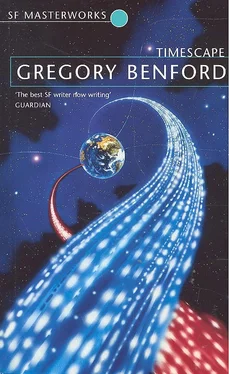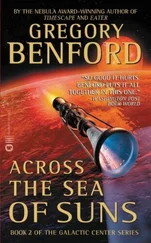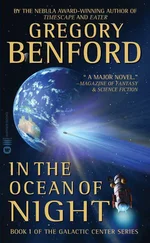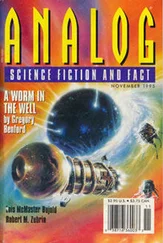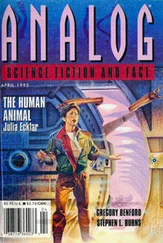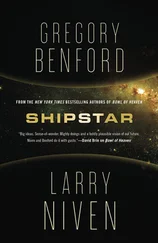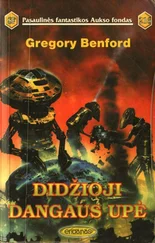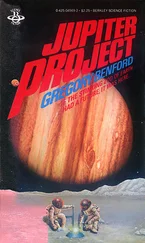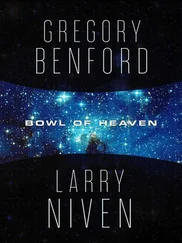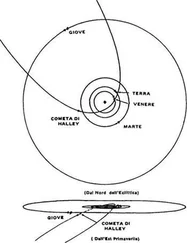• • •
Saul Shriffer called in mid-July. He had finished up the observations of 99 Hercules, using the Green Bank radio telescope. Results were negative. No coherent signal rose up out of the interstellar sputter. Gordon suggested using higher frequencies and narrower bandwidths. Saul said he had tried some. Without more to show for their efforts, though, he wasn’t going to be able to get any more time on the instrument. Conventional research projects had precedence. They talked for a few minutes about alternatives, but there weren’t any. The Cavendish group had turned down Saul’s request for telescope time. Saul said a few reassuring things, and Gordon mechanically agreed. When Saul hung up Gordon felt an unexpected letdown. He saw that, without admitting it to himself, he had been pinning hope on the radio-listening idea. That evening, when he met Penny for dinner at Buzzy’s, he did not mention the call. The next day he wrote Saul a letter asking that he not publish any summary of the radio search. Let’s wait until something positive comes along, he argued. But more than that, Gordon wanted to keep quiet. Maybe it would all go away. Maybe it would be forgotten.
• • •
When Penny went board surfing at Scripps Beach, Gordon sat on the sand and watched. He had been doing a lot of that recently—sitting, thinking, letting others play out the summer. He liked running on the beach and knew he should try riding the waves, now that he had someone to teach him, but something held him back. He watched the La Jolla ladies work on their expensive tans, and came to know the types: People who worked outdoors were pale behind the knees, whereas beach loungers were a uniform chocolate, a consummation carefully arrived at.
Penny came out of the tumbling waters, board perched on a hip, straggly hair dripping. She sagged down beside him, wrung out her hair, flicked a glance at his set expression. “Okay,” she said finally, “time to ‘fess up.”
“Fess who?”
“Fess Parker . Gordon, come on . You’re doing your zombie imitation.”
Gordon had always prided himself on getting right to the point; now he found himself rummaging for something to say. “Y’know… I’ve been looking through the journals in the library. Astronomy journals, I mean. Mercury, Scientific American, Science News . Most of them are flat out ignoring Saul’s PR work. Even if they mention it, they don’t reproduce the picture. And not a one gave the Hercules coordinates.”
“Publish them yourself.”
Gordon shook his head. “Won’t do any good.”
“When did you start feeling so inadequate?”
“At ten,” Gordon said, hoping for some way to defleet this conversation, “when I began to suspect I wasn’t Mozart.”
“Uh huh.”
“I was that American myth, the 98-pound weakling. Those Charles Atlas ads, remember. When I went to the beach, bullies didn’t kick sand in my face—they’d kick me in the face. Eliminate the middle man.”
“Uh huh.” She studied him, face compressed. “You know that was the first thing you’ve told me about the Saul business in, what, a month?”
He shrugged.
“You never tell me anything anymore.”
“I don’t want to get you so involved that people will ask you about it. So you’ll have to defend me to friends.” He paused. “Or deal with cranks.”
“Gordon, I’d rather know what’s going on. Really. If I’m to talk to UCLJ people I can’t very well gloss over it.”
He shrugged again. “Big deal. I might be leaving UCLJ anyway.”
“What?”
So he told her about not getting the Merit Increase. “Look,” he concluded, “being appointed an Assistant Professor is always risky. You may have to move on if things don’t work out. I outlined all that to you. We talked it over.”
“Well, sure, eventually…” She stared off toward La Jolla Point, face blank. “I mean, in the long run, if you didn’t publish…”
“I’ve published,” he murmured in a half-breath, defensively.
“Then why?”
“The business with Lakin. I can’t do research in a group with two guys I like, Feher and Schultz, and one I rub the wrong way, Lakin. Personalities are—”
“I thought scientists rose above mere squabbling. You told me that once.”
“This is more than a squabble, can’t you see that?”
“Ha.”
“Lakin is kind of out of the old school Skeptical. Thinks I’m trying to deliberately make trouble for him.” He ticked off motivations on his fingers. “Getting older and feeling a little shaky, maybe. Hell, I dunno. But I can’t work in a group dominated by a guy like that. I’ve told you that before.”
“Ah.” Her voice had a brittle edge. “So, in effect, we talked that one out, too?”
“Oh, Christ.”
“I’m glad you’re conferring with me on all these problems. On your problems.”
“Look—” he spread his hands, a wide gesture—“I don’t know what I’ll do. I was just talking.”
“It’ll mean leaving La Jolla. Leaving California, where I lived all my life? If that comes up, give me a few minutes to mull it over, okay?”
“Sure. Sure.”
“You can still stay on here, though? It’s your choice?”
“Yeah. We’ll decide it together.”
“Good. Fair and square? Open? No holding yourself aloof?”
“One man, one vote.”
“That’s what I’m afraid of.”
“One person , one vote.”
“Zappo.”
Gordon lay down and opened a wrinkled Time magazine against the hovering sun. He tried to dismiss the boiling alternatives in his head and concentrate on a piece in the Science section on the planned Apollo moon shots. He made progress slowly; a decade of reading the close-packed language of physics had robbed him of speed. On the other hand, it did make him more conscious of style. He was gradually coming to feel that the breezy simplicities of Time hid more than they revealed. He was mulling this point when a shadow fell over him.
“Thought I recognized you,” a gruff man’s voice said.
Gordon blinked up into the hazy sunshine. It was Cliff, in a bathing suit and carrying a sixpack of beer.
Gordon became very still. “I thought you lived in northern California.”
“Hey! Cliffie!” Penny had rolled over and seen him. “Whacha doin’ here?” She sat up.
Cliff squatted on the sand, eyeing Gordon. “Jest walkin’ along. My day off. Got a job in Oceanside.”
“And you saw us here?” Penny said happily. “How long have you been down this way? You should’ve called me.”
“Yes,” Gordon said dryly, “a remarkable coincidence.”
“Little over a week. Got me a job in two days flat.”
Cliff hunkered down, not sitting on the sand but resting with the beer in both hands between his legs and his buttocks only an inch from the beach. Gordon remembered seeing Japanese perched like that for hours, in a movie somewhere. It was a curious pose, as though Cliff did not wish to commit himself to fully sitting with them.
Penny burbled on, but Gordon was not listening. He studied Cliff’s sun-baked ease and looked for something behind the eyes, something that explained this improbable coincidence. He did not believe it for an instant, of course. Cliff knew that Penny surfed and that this was the nearest good beach. The only interesting question was whether Penny had known this was going to happen as well.
There was no sign between them, no small inexplicable smiles, no gestures, no false notes that Gordon could see. But that was just it—he wasn’t good at that sort of thing. And as he watched them talking with their slow and easy grace they seemed so alike, so familiar from a thousand movies and cigarette ads, and so strange. Gordon sat, white as the underbelly of a fish in comparison, a flabby dirty alabaster with black swirls of hair. He felt a slow flush of emotion, a wash of feeling he could not quite name. He did not know if this was some elaborate, cute game they were playing, but if it was—
Читать дальше
